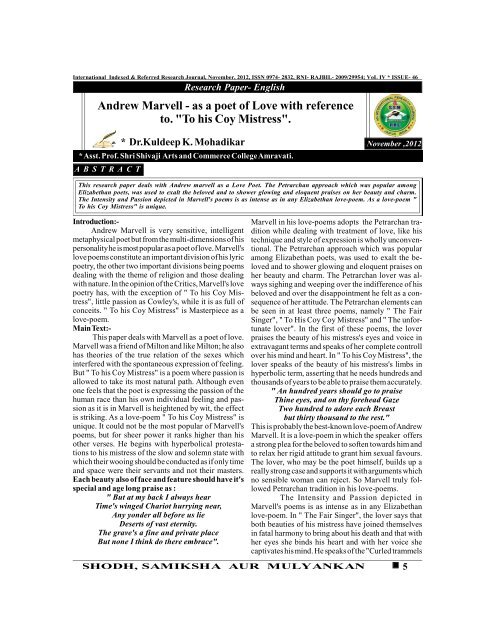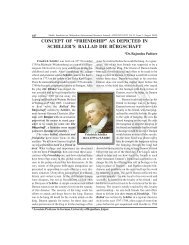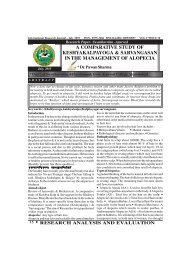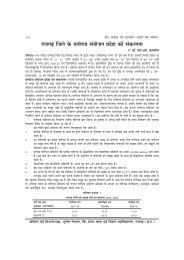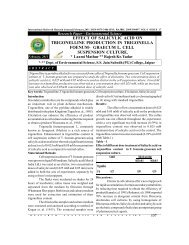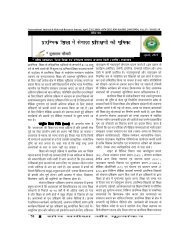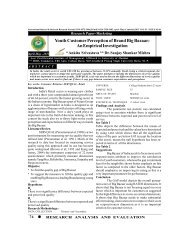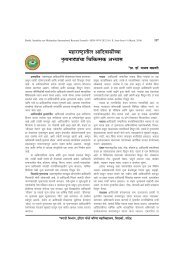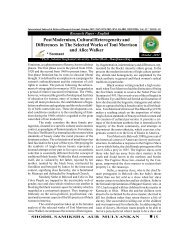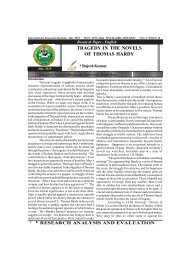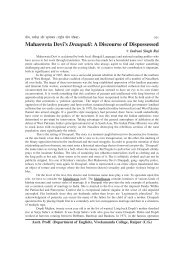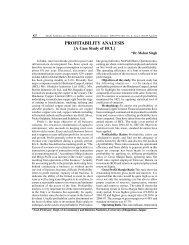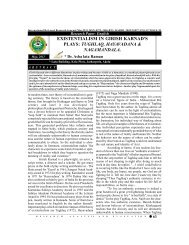Andrew Marvell - as a poet of Love with reference to. "To his Coy ...
Andrew Marvell - as a poet of Love with reference to. "To his Coy ...
Andrew Marvell - as a poet of Love with reference to. "To his Coy ...
Create successful ePaper yourself
Turn your PDF publications into a flip-book with our unique Google optimized e-Paper software.
International Indexed & Referred Research Journal, November, 2012, ISSN 0974- 2832, RNI- RAJBIL- 2009/29954; VoL IV * ISSUE- 46<br />
Research Paper- English<br />
<strong>Andrew</strong> <strong>Marvell</strong> - <strong>as</strong> a <strong>poet</strong> <strong>of</strong> <strong>Love</strong> <strong>with</strong> <strong>reference</strong><br />
<strong>to</strong>. "<strong>To</strong> <strong>his</strong> <strong>Coy</strong> Mistress".<br />
* Dr.Kuldeep K. Mohadikar<br />
* Asst. Pr<strong>of</strong>. Shri Shivaji Arts and Commerce College Amravati.<br />
A B S T R A C T<br />
Introduction:-<br />
<strong>Andrew</strong> <strong>Marvell</strong> is very sensitive, intelligent<br />
metaphysical <strong>poet</strong> but from the multi-dimensions <strong>of</strong> <strong>his</strong><br />
personality he is most popular <strong>as</strong> a <strong>poet</strong> <strong>of</strong> love. <strong>Marvell</strong>'s<br />
love poems constitute an important division <strong>of</strong> <strong>his</strong> lyric<br />
<strong>poet</strong>ry, the other two important divisions being poems<br />
dealing <strong>with</strong> the theme <strong>of</strong> religion and those dealing<br />
<strong>with</strong> nature. In the opinion <strong>of</strong> the Critics, <strong>Marvell</strong>'s love<br />
<strong>poet</strong>ry h<strong>as</strong>, <strong>with</strong> the exception <strong>of</strong> " <strong>To</strong> <strong>his</strong> <strong>Coy</strong> Mistress",<br />
little p<strong>as</strong>sion <strong>as</strong> Cowley's, while it is <strong>as</strong> full <strong>of</strong><br />
conceits. " <strong>To</strong> <strong>his</strong> <strong>Coy</strong> Mistress" is M<strong>as</strong>terpiece <strong>as</strong> a<br />
love-poem.<br />
Main Text:-<br />
T<strong>his</strong> paper deals <strong>with</strong> <strong>Marvell</strong> <strong>as</strong> a <strong>poet</strong> <strong>of</strong> love.<br />
<strong>Marvell</strong> w<strong>as</strong> a friend <strong>of</strong> Mil<strong>to</strong>n and like Mil<strong>to</strong>n; he also<br />
h<strong>as</strong> theories <strong>of</strong> the true relation <strong>of</strong> the sexes which<br />
interfered <strong>with</strong> the spontaneous expression <strong>of</strong> feeling.<br />
But " <strong>To</strong> <strong>his</strong> <strong>Coy</strong> Mistress" is a poem where p<strong>as</strong>sion is<br />
allowed <strong>to</strong> take its most natural path. Although even<br />
one feels that the <strong>poet</strong> is expressing the p<strong>as</strong>sion <strong>of</strong> the<br />
human race than <strong>his</strong> own individual feeling and p<strong>as</strong>sion<br />
<strong>as</strong> it is in <strong>Marvell</strong> is heightened by wit, the effect<br />
is striking. As a love-poem " <strong>To</strong> <strong>his</strong> <strong>Coy</strong> Mistress" is<br />
unique. It could not be the most popular <strong>of</strong> <strong>Marvell</strong>'s<br />
poems, but for sheer power it ranks higher than <strong>his</strong><br />
other verses. He begins <strong>with</strong> hyperbolical protestations<br />
<strong>to</strong> <strong>his</strong> mistress <strong>of</strong> the slow and solemn state <strong>with</strong><br />
which their wooing should be conducted <strong>as</strong> if only time<br />
and space were their servants and not their m<strong>as</strong>ters.<br />
Each beauty also <strong>of</strong> face and feature should have it's<br />
special and age long praise <strong>as</strong> :<br />
" But at my back I always hear<br />
Time's winged Chariot hurrying near,<br />
Any yonder all before us lie<br />
Deserts <strong>of</strong> v<strong>as</strong>t eternity.<br />
The grave's a fine and private place<br />
But none I think do there embrace".<br />
SHODH, SAMIKSHA AUR MULYANKAN<br />
November ,2012<br />
T<strong>his</strong> research paper deals <strong>with</strong> <strong>Andrew</strong> marvell <strong>as</strong> a <strong>Love</strong> Poet. The Petrarchan approach which w<strong>as</strong> popular among<br />
Elizabethan <strong>poet</strong>s, w<strong>as</strong> used <strong>to</strong> exalt the beloved and <strong>to</strong> shower glowing and eloquent praises on her beauty and charm.<br />
The Intensity and P<strong>as</strong>sion depicted in <strong>Marvell</strong>'s poems is <strong>as</strong> intense <strong>as</strong> in any Elizabethan love-poem. As a love-poem "<br />
<strong>To</strong> <strong>his</strong> <strong>Coy</strong> Mistress" is unique.<br />
<strong>Marvell</strong> in <strong>his</strong> love-poems adopts the Petrarchan tradition<br />
while dealing <strong>with</strong> treatment <strong>of</strong> love, like <strong>his</strong><br />
technique and style <strong>of</strong> expression is wholly unconventional.<br />
The Petrarchan approach which w<strong>as</strong> popular<br />
among Elizabethan <strong>poet</strong>s, w<strong>as</strong> used <strong>to</strong> exalt the beloved<br />
and <strong>to</strong> shower glowing and eloquent praises on<br />
her beauty and charm. The Petrarchan lover w<strong>as</strong> always<br />
sighing and weeping over the indifference <strong>of</strong> <strong>his</strong><br />
beloved and over the disappointment he felt <strong>as</strong> a consequence<br />
<strong>of</strong> her attitude. The Petrarchan elements can<br />
be seen in at le<strong>as</strong>t three poems, namely " The Fair<br />
Singer", " <strong>To</strong> His <strong>Coy</strong> <strong>Coy</strong> Mistress" and " The unfortunate<br />
lover". In the first <strong>of</strong> these poems, the lover<br />
praises the beauty <strong>of</strong> <strong>his</strong> mistress's eyes and voice in<br />
extravagant terms and speaks <strong>of</strong> her complete controll<br />
over <strong>his</strong> mind and heart. In " <strong>To</strong> <strong>his</strong> <strong>Coy</strong> Mistress", the<br />
lover speaks <strong>of</strong> the beauty <strong>of</strong> <strong>his</strong> mistress's limbs in<br />
hyperbolic term, <strong>as</strong>serting that he needs hundreds and<br />
thousands <strong>of</strong> years <strong>to</strong> be able <strong>to</strong> praise them accurately.<br />
" An hundred years should go <strong>to</strong> praise<br />
Thine eyes, and on thy forehead Gaze<br />
Two hundred <strong>to</strong> adore each Bre<strong>as</strong>t<br />
but thirty thousand <strong>to</strong> the rest."<br />
T<strong>his</strong> is probably the best-known love-poem <strong>of</strong> <strong>Andrew</strong><br />
<strong>Marvell</strong>. It is a love-poem in which the speaker <strong>of</strong>fers<br />
a strong plea for the beloved <strong>to</strong> s<strong>of</strong>ten <strong>to</strong>wards him and<br />
<strong>to</strong> relax her rigid attitude <strong>to</strong> grant him sexual favours.<br />
The lover, who may be the <strong>poet</strong> himself, builds up a<br />
really strong c<strong>as</strong>e and supports it <strong>with</strong> arguments which<br />
no sensible woman can reject. So <strong>Marvell</strong> truly followed<br />
Petrarchan tradition in <strong>his</strong> love-poems.<br />
The Intensity and P<strong>as</strong>sion depicted in<br />
<strong>Marvell</strong>'s poems is <strong>as</strong> intense <strong>as</strong> in any Elizabethan<br />
love-poem. In " The Fair Singer", the lover says that<br />
both beauties <strong>of</strong> <strong>his</strong> mistress have joined themselves<br />
in fatal harmony <strong>to</strong> bring about <strong>his</strong> death and that <strong>with</strong><br />
her eyes she binds <strong>his</strong> heart and <strong>with</strong> her voice she<br />
captivates <strong>his</strong> mind. He speaks <strong>of</strong> the "Curled trammels<br />
5
International Indexed & Referred Research Journal, November, 2012, ISSN 0974- 2832, RNI- RAJBIL- 2009/29954; VoL IV * ISSUE- 46<br />
<strong>of</strong> her hair" in which <strong>his</strong> soul h<strong>as</strong> got entangled. If a<br />
lover can speak about <strong>his</strong> feelings, we cannot say that<br />
he is a cold kind <strong>of</strong> lover. In the poem " <strong>To</strong> <strong>his</strong> <strong>Coy</strong><br />
Mistress", the p<strong>as</strong>sion is equally ardent. In the final<br />
Stanza <strong>poet</strong> presents fierce p<strong>as</strong>sion when he suggests<br />
that :<br />
" Let us roll our Strength, and all<br />
Our Sweetness, up in<strong>to</strong> one Ball :<br />
And tear our ple<strong>as</strong>ures <strong>with</strong><br />
rough strife.<br />
Through the iron gates <strong>of</strong> Life"<br />
Poet expresses in the above lines that they should<br />
enjoy the ple<strong>as</strong>ure <strong>of</strong> love-making <strong>with</strong> all their energy<br />
and vigour and they should even become fierce in<br />
extracting the maximum ple<strong>as</strong>ure from their lovemaking.The<br />
Poem " <strong>To</strong> His <strong>Coy</strong> Mistress" h<strong>as</strong> t<strong>his</strong><br />
intellectual quality though the p<strong>as</strong>sion strikes through<br />
logic and re<strong>as</strong>oning. T<strong>his</strong> Poem follows Syllogistic<br />
Pattern in its construction. Syllogism h<strong>as</strong> three stages<br />
: "if", "but", 'therefore". T<strong>his</strong> poem begins <strong>with</strong> if, we<br />
are <strong>to</strong>ld in the opening lines what the effect would be<br />
if the lovers had enough space and time <strong>with</strong> them. The<br />
second stanza deals <strong>with</strong> second stage i.e. But, " But<br />
at my back I always hear..."). The rest <strong>of</strong> the lines tells<br />
us why the lovers cannot spend their time and the<br />
space, <strong>as</strong> per their wish. The third stage begins <strong>with</strong><br />
first line <strong>of</strong> the third stanza. Their are many conceits in<br />
t<strong>his</strong> poem and all are popular except the conceit in the<br />
closing eight lines which may create Problem.<br />
<strong>Marvell</strong>'s best poems were written in the early<br />
1650's. " The Definition <strong>of</strong> love" and "<strong>To</strong> His <strong>Coy</strong><br />
Mistress" are among the great metaphysical poems <strong>of</strong><br />
love, but the latter also follows cl<strong>as</strong>sical tradition and<br />
both have perfect Symmetry and Swift. They are not<br />
more simple but they are under perfect control. The<br />
essence <strong>of</strong> both poems is paradox, yet every idea and<br />
word is an integral part <strong>of</strong> the pattern. The very title, "<br />
The Definition <strong>of</strong> love is paradoxical and the infinity <strong>of</strong><br />
frustrated love is rendered in terms <strong>of</strong> the exact sciences<br />
<strong>of</strong> <strong>as</strong>tronomy and geometry "<strong>To</strong> His <strong>Coy</strong> Mistress"<br />
is the period's finest variation on the theme <strong>of</strong><br />
Carpe diem. A series <strong>of</strong> Witty particular, hyperbolical<br />
fancies about unlimited space and time lead <strong>to</strong> the grim<br />
R E F E R E N C E<br />
6<br />
fact <strong>of</strong> mortality, which is realized in phr<strong>as</strong>es half general<br />
and suggestive, half particular and Concrete. The<br />
lover resolves the antithesis between love and death<br />
<strong>with</strong> the earnestness <strong>to</strong> use and conquer time.<br />
In some <strong>of</strong> <strong>his</strong> love-poems, <strong>Marvell</strong> shows the<br />
Elizabethan influence by following the Petrarchan tradition.<br />
In these poems he shows tendency <strong>to</strong> Swell on<br />
charms <strong>of</strong> the beloved in the extravagant terms, <strong>as</strong> w<strong>as</strong><br />
the c<strong>as</strong>e <strong>with</strong> Elizabethan love-<strong>poet</strong>s who followed the<br />
Pertrarchan mode <strong>of</strong> love-making. In these poems by<br />
<strong>Marvell</strong>, we have the same sighs and tears and the same<br />
exaltation <strong>of</strong> the beauties <strong>of</strong> the beloved <strong>as</strong> we find in<br />
the Elizabethan love-lyrics. In "The Unfortunate lover",<br />
we are <strong>to</strong>ld that the tyrant god <strong>of</strong> love used " all <strong>his</strong><br />
winged artillery", and the lover found himself between<br />
"the flames and the Waves. The lover w<strong>as</strong> forced <strong>to</strong> live<br />
in s<strong>to</strong>rms and wars. He w<strong>as</strong> <strong>to</strong>rn in<strong>to</strong> flames and ragged<br />
<strong>with</strong> wounds. He w<strong>as</strong> a lover dressed in <strong>his</strong> own blood.<br />
" <strong>To</strong> His <strong>Coy</strong> Mistress" is another poem in which the<br />
Petrarchan hyperbole and Elizabethan Conceits combine<br />
<strong>with</strong> a metaphysical Condensation <strong>of</strong> Style which<br />
is almost epigrammatic. The lover here needs a hundred<br />
years <strong>to</strong> praise <strong>his</strong> mistress's eyes and <strong>to</strong> gaze on her<br />
forehead. He needs two hundred years <strong>to</strong> adore each<br />
<strong>of</strong> her bre<strong>as</strong>ts and he needs thirty thousand years <strong>to</strong><br />
praise the remaining parts <strong>of</strong> her body. The p<strong>as</strong>sion <strong>of</strong><br />
the Elizabethan lyric is also <strong>to</strong> be found in t<strong>his</strong> poem and<br />
it finds a notable expression in the closing six lines<br />
where the lover suggests that he and she should roll all<br />
their strength and tear their ple<strong>as</strong>ures <strong>with</strong> rough strife<br />
through the iron gates <strong>of</strong> life. The p<strong>as</strong>sion is certainly<br />
Elizabethan in its intensity, the conceit employed <strong>to</strong><br />
express the p<strong>as</strong>sion is thoroughly metaphysical. As for<br />
the condensed Style, its becomes epigrammatic in such<br />
lines <strong>as</strong> these :<br />
" The grave's a fine and private place, But none, I think,<br />
do there embrace."<br />
Conclusion:-<br />
It is <strong>to</strong> be concluded that poems <strong>of</strong> love are not<br />
numerous in <strong>Marvell</strong>'s work, but among several which<br />
are graceful or slightly ironical, denouncing women's<br />
tricks, artifices and Coquetry and few hold us by their<br />
p<strong>as</strong>sion.<br />
1) A His<strong>to</strong>ry <strong>of</strong> English Literature by Legouis and Cazamian.<br />
2) Andew <strong>Marvell</strong>: an evaluation <strong>of</strong> <strong>his</strong> <strong>poet</strong>ry: Rama Brothers,2004 published by Educational Publishers, New Delhi,2004.<br />
3) <strong>To</strong> <strong>his</strong> <strong>Coy</strong> Mistress".page no.107, Rama Brothers,2004 published by Educational Publishers, New Delhi,2004.


